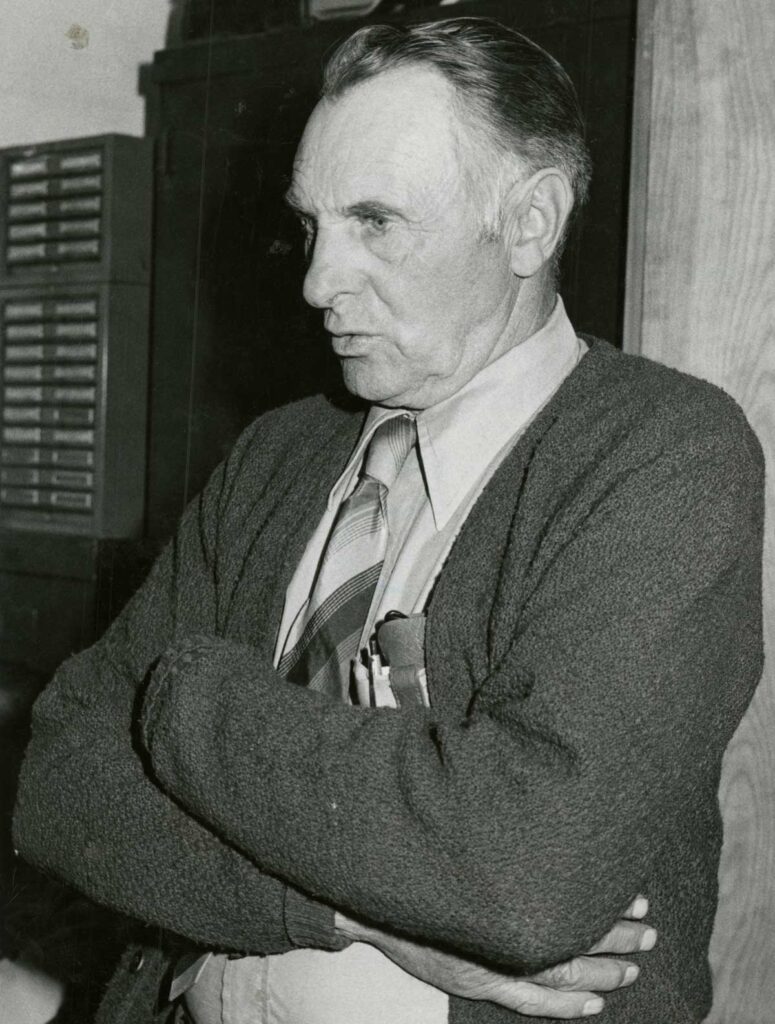Otto Carpenter is best known as one of the founders of Snow Park, the old mom-and-pop ski area at the base of what is now Deer Valley. These days you can find chairlifts there named for him and his partner, Bob Burns.
But Otto’s most enduring legacy may be a modest one-story building off the beaten path at 1361 Woodside Avenue in Park City, as Steve Leatham wrote about in a Way We Were article four years ago.
In 1976, looking for a meeting place for Park City’s senior citizens, Otto and Bob Burns approached the Union Pacific Railroad about acquiring a mothballed train depot that had once served the small Wasatch County community of Keetley (later flooded by the Jordanelle Reservoir). They were told, “If you can move it, you can have it.”
Burns and Carpenter then cajoled the Park City Council into giving them a 99-year lease at $1 a year on a valuable piece of city property not far from the base of what was then the Park City Resort.
“We know the ground is worth a lot of money, but we feel our senior citizens are every bit as important as the resort,” Otto told the council in May 1976. “It’s a road you’ll all have to walk someday.”
That October, in a three-truck convoy, the 2,400-square-foot depot mounted on 52 wheels was nudged 15 miles from Keetley onto its new foundation on Woodside Avenue. For the next 14 months, Otto and friends devoted countless hours to converting the old depot into the new Park City Senior Center.
“He [Otto] has worked for over a year, and I don’t think there have been many days that he hasn’t spent time in this building,” Violet Terry, president of the Park City Senior Citizens, said when the new center was dedicated in January 1978.

Credit: Park City Historical Society & Museum, Park Record Collection
Negotiating that lease wasn’t the first time that Otto had challenged City government, and it wouldn’t be the last. He often spoke up for many of Park City’s mining-era survivors who felt victimized by ballooning property taxes, isolated by the exodus of essential services from Main Street, and alienated by city officials representing “outside interests” who allowed “skyscrapers” in Old Town but told you what kind of shingles you could put on your roof.
“They’re driving us out is what they’re doing,” Otto fumed at a City Council meeting in September 1982 when a proposed development threatened – in his opinion, at least – to drive up municipal water rates. “We have an interest in this town and we shouldn’t be shoved around all this time. Us old timers have gotten the shaft long enough.”
A witness of the shoestring city budgets of the 1950s, Otto often railed against what he saw as outrageous expenditures by later city officials. “Why did the city manager give the telephone company one hundred thousand dollars to move the lines that had only a short time ago been installed?” he asked in a letter to the editor in October 1981. “What kind of a money tree do we have …?”
In another letter to the editor, Otto tangled with cross-country skier Jim Miller after Miller used his column in the (Park City) Newspaper to grumble about snowmobiles.
“We Utahns like our snowmobiling as well as skiing,” Otto shot back. “If there isn’t room enough for both and these cross-country skiers are afraid of noise, maybe they should go to Colorado or Russia where there isn’t any.”
Otto died in October 1996 at age 92 in the home he built on Norfolk Avenue. He may have mellowed in his final years, but I doubt it.
Meanwhile, there are signs that Park City’s senior citizens have outgrown their beloved gathering place of 46 years. As the Park Record reported last November, representatives of the city’s “silver tsunami” have been working with local government on plans for a larger facility to be built on the same property.
And the century-old Keetley train depot? Well, it may be looking for a new home once again.
The Park City Museum’s next lecture, given by Matt Melville, is on April 17 from 5 to 6 p.m. and covers early prominent Parkite Henry Shields. It will take place at the Museum’s Education and Collections Center at 2079 Sidewinder Drive